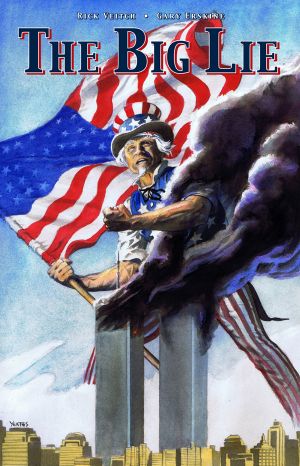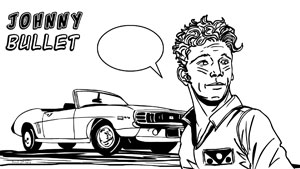|
|
 |
The Big Lie tells the sci-fi story of Sandra Stratton, a scientist working with the Large Hadron Collider who specializes in Tachyon research. Tachyons are “elusive quantum bits that travel backwards in time.” Sandra somehow manages to travel backwards in time using Tachyons to the hour just before the planes strike the Twin Towers. She was aiming for 6 days before, but apparently those pesky Tachyons don’t behave as they are supposed to. She only has one hour to convince her husband and his smug Hollywood consultants to abandon the tower. They are meeting in the North Tower to hammer out the details behind the funding and shooting logistics of a director named “Stephen’s” next movie, which just so happens to be about crashing a plane into a skyscraper and various subsequent wars shot in the Middle East. Sandra shows up amidst the meeting, tries to convince them to get out of the tower, shows them the evidence that the attacks were planned by elements within the US government, and the subsequent decade of death, destruction, and war that plagues the Middle East, to no avail. The consultants, including her husband, fail to believe anything that she has to say. They simply can’t believe that such a far reaching plot is possible, or that the US military would fail to bring down any hijacked passenger plane aimed at the WTC. They are more interested in her time traveling iPad and its Apple Computer logo. At the time, iPods weren’t prevalent and Apple was circling the drain as a company. Not until the first plane strikes the tower and the thermite charges used in controlled demolition are revealed along the tower’s support beams do they all believe her. This fictional account of time travel and conspiracy is narrated by none other than Uncle Sam himself, lending an air of gravity and distance to it as if the events of 9/11 and those behind the attacks, here insinuated to be members of the United States government itself, truly do not represent America or the American spirit. Uncle Sam is out there and he’s not the puppet of Neo-Cons, conspirators, or terrorists. He’s the will of the people to question and act.
 |
The people are whom The Big Lie is aimed at persuading to consider the evidence presented within. The only problem is that Veitch’s mixing of a sci-fi plot and including a shot of fictionalized thermite charges attached to the WTC support beams (a fact that has never been confirmed and has never been seen by anyone who survived the attack or communicated to anyone during the attack) has a fictionalizing “X-Files” type of affect on the only plausible aspects of the “Truther” argument, that the attacks were “allowed” to happen or at least were not seriously guarded against and used as a mantra to pursue a Neo-Con and aggressive incursion into the Middle East, an incursion that has made the oil companies richer and military contractors, like Haliburton, extremely more lucrative. The images of “little grey men” inscribed into the collective pop unconsciousness of not only Americans, but X-Files fans around the world, by The X-Files television series has taken away nearly any serious scientific attention to the existence of the “little grey aliens.” That is not to say that “little grey aliens” existed before we became desensitized to the early, and quite scary, stories people told about abductions etc, and do not now because of the fictionalization of them. People will believe or disbelieve whatever they want in the Internet age, despite evidence to the confirmation or contradiction of such conspiracy themes. The fact is that now people are more likely to laugh off the idea of “little grey aliens” as Hollywood fictionalizations of mass hallucinations. By crafting a sci-fi story around the events of 9/11, while simultaneously loading it with evidence that is in some instances deductively sound and others disproved, but all worth consideration, Veitch seems to be lessening the affect that the presentation of these theories can have rather than reinforcing it.
 Remember and honor. |
The truth of the “Truther” accusations being laid out in The Big Lie is not the focus of this look at this comic book though. Again, people will believe or disbelieve whatever they want in disregard to the facts that either confirm or deny their beliefs. The focus here is that while The Big Lie has merit in its motivation, it fails in its execution. A comic book that told the story of a “Truther” investigation, based in reality, and painted with characters that aren’t so starkly black and white ideologically would have gone much further to convince its targeted readers to at least consider the arguments made within. It also fails to paint any seriously sympathetic portrait, by failing to include the stories of, any first responders who lost their lives or any realistic or sympathetic victims. Veitch though had no intent to include these types of characters apparently. Again, this is to the detriment of the book. A way to commemorate the victims and events of 9/11 with more poignancy would have been to craft a story that focused on the human toll, the lives lost, and tragedies that have occurred in the past decade, which includes the toll the Iraq War has wrought. A focus on these events will go a longer way towards keeping Americans aware, interested in, and dedicated to preserving the memory of those terrible days, and pursuing the root causes and events of that one fateful day. A sci-fi frame story dealing with varyingly valid and vapid theories just doesn’t show the proper respect for the intentions of anyone who is still struggling to understand and overcome the events of 9/11.
© Copyright 2002-2019 by Toon Doctor Inc. - All rights Reserved. All other texts, images, characters and trademarks are copyright their respective owners. Use of material in this document (including reproduction, modification, distribution, electronic transmission or republication) without prior written permission is strictly prohibited.

